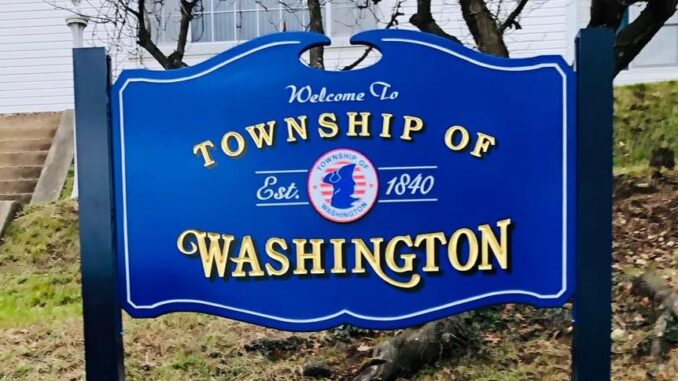
TOWNSHIP OF WASHINGTON—Approximately 950 tons of soil will be excavated from two areas at the former Department of Municipal Facilities building, and those areas backfilled with clean soil as part of an extensive $193,450 remediation project being undertaken to solve a decades-long pollution problem at the public works facility.
That’s according to Lisko Environmental Services LLC’s proposal to remediate long standing contamination at the site following the removal of two 3,000-gallon gasoline tanks and one 2,000-gallon diesel tank in 1998.
Soil contamination caused by a loose fitting on a gasoline tank was noted in 1998, said Lisko’s proposal, and soil samples collected then showed contamination levels above NJDEP soil cleanup standards.
The township was originally under a May 2021 deadline to remediate the soil contamination but that deadline has been extended into mid-2022, said officials.
Meanwhile, much public pushback has occurred as town officials sought to find alternate parking locations for the DPW’s large, heavy-duty vehicles such as garbage trucks, dump trucks, front-end loaders, and large equipment.
In early April, following multiple failed attempts to find alternate DPW parking locations around town and public resistance to parking oversize DPW vehicles and equipment at Sherry Field, and a public lot behind the Dog House Saloon, the council approved a $60,600 contract with Our Lady of Good Counsel Church to lease 35 parking spaces for two years.
Most DPW vehicles are now parked at the OLGC parking lot and behind Valley Bank, which offered free parking for some DPW equipment and vehicles, and in the municipal lot.
Digging out
Outreach to Lisko consultant Darin Vogel and Township Attorney Kenneth Poller to get an estimated start date and project timeline was not returned by press time.
A 10-page contract with Lisko approved June 21 by the Township Council and provided to Pascack Press shows a 12-week timeline for the soil remediation project, although it notes “actual scheduling will depend on the status of site demolition and construction activities as well as subcontractor availability.”
The professional services contract was approved by a council resolution June 21, with both Township Attorney Kenneth Poller and Administrator Robert Tovo noting that it made more sense to go with a consultant who had prior experience with the DMF (public works) site and familiarity with its contamination concerns.
Lisko Environmental Services LLC of Belmar provides an itemized list of costs, noting gross costs of $174,866 for excavation of impacted soil; $7,775 for licensed site remediation professional (LSRP) oversight and project management; $6,500 for monitoring well reinstallation; and $4,400 for the abandonment of current monitoring wells. The contract notes any and all NJDEP fees for the project are the Township’s responsibility.
The site has been part of NJDEP’s licensed site remediation professional oversight program since 2012. That state program allows environmental site remediation work to be conducted without direct NJDEP oversight and approval.
As part of scheduled work, Lisko will oversee the abandonment of current monitoring wells used to monitor off-site groundwater contamination. These monitoring wells will be sealed by a licensed well driller prior to excavation of contaminated soils.
Darin Vogel, of Lisko, the project’s current LSRP, will oversee the remediation work, handling excavation oversight, utility markouts, follow-up soil sampling and groundwater sampling for toxic chemicals, as well as project status updates.
Lisko’s proposal states that it recommends removal of potentially contaminated soils to groundwater level at two locations. Possible soil amounts and sites include 550 cubic yards of soil to be excavated at the former gasoline underground storage tank system area, and 40 cubic yards of contaminated soil from the above-ground waste oil collection storage tank, notes the proposal.
Potentially contaminated soils that are excavated on-site will be temporarily stockpiled on plastic or loaded directly into dump trucks for off-site disposal, states the cleanup contract.
Per state environmental requirements, the post-excavation soil samples collected by Lisko on the gasoline storage site will be analyzed for benzene, toulene, ethylbenzene, and xylenes (BTEX), plus methyl turt-butyl ether (MTBE), tert-butyl alcohol (TBA), and lead while the oil storage tank area samples will also be monitored for cadmium.
After remediation activities conclude with acceptable soil test results, Lisko will oversee the installation of replacement monitoring wells by a licensed well driller. The consultant said that the location and specifications for these wells “shall be similar to the abandoned wells that they are to replace.”
Lisko recommends these new wells only be installed after heavy construction activities are completed.
In a contract section called “Additional Assumptions And/Or Exclusions,” the consultant notes that “soil disposal pricing is subject to change as a result of waste classification sampling and final approval from the disposal facility.”
The section notes that excavation of contaminated soils “will likely generate odors” and that Lisko “will continuously monitor ambient air during excavation activities and take appropriate action should levels become unsafe.”
It notes that, “ideally work should be completed during autumn or winter months so as to keep odors to a minimum.”
The contract also requires “unimpeded site access” for tri-axle trucks to the excavation and soil stockpiling areas, and the restriction of 14 parking spaces in front of the former DMF building to allow for easy and safe truck access near the municipal parking lot.
Under “oversight and project management”, an itemized breakdown by Lisko shows 55 billable hours for LSRP oversight, a project scientist, data management, plus a separate $150 charge for a field vehicle and tools, which totals $7,775.
The 25 hours for LSRP review and oversight are billed at $175 per hour.
Under “excavation of impacted soil” the budget lists $143,082.50 for subcontractor excavation of impacted soil, $13,750 for event preparation and oversight by a project scientist, $9,500 for materials, and $2,518.50 for lab analysis of soil and groundwater samples. Other miscellaneous costs bring the total budget category to $174,866.
Under “monitoring well reinstallation” the budget shows $4,925.45 for a licensed well driller, $1,250 for event preparation and oversight by a project scientist, plus miscellaneous costs adding up to $6,500.
